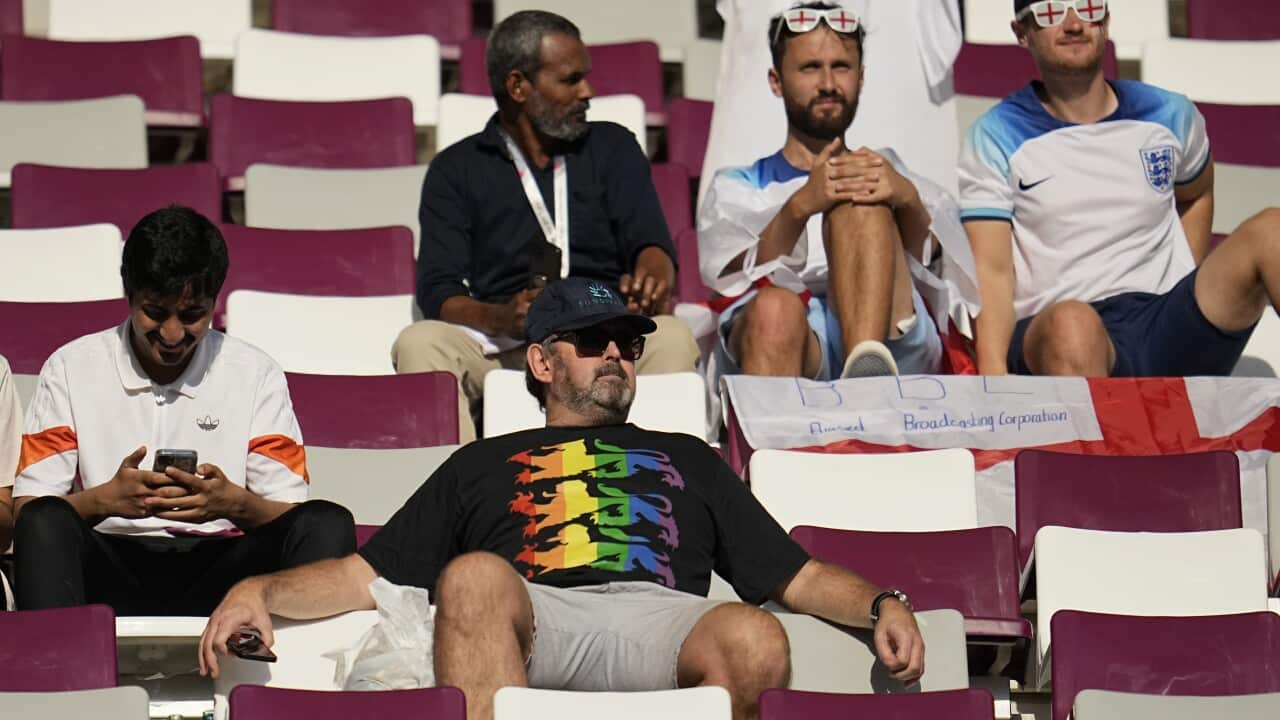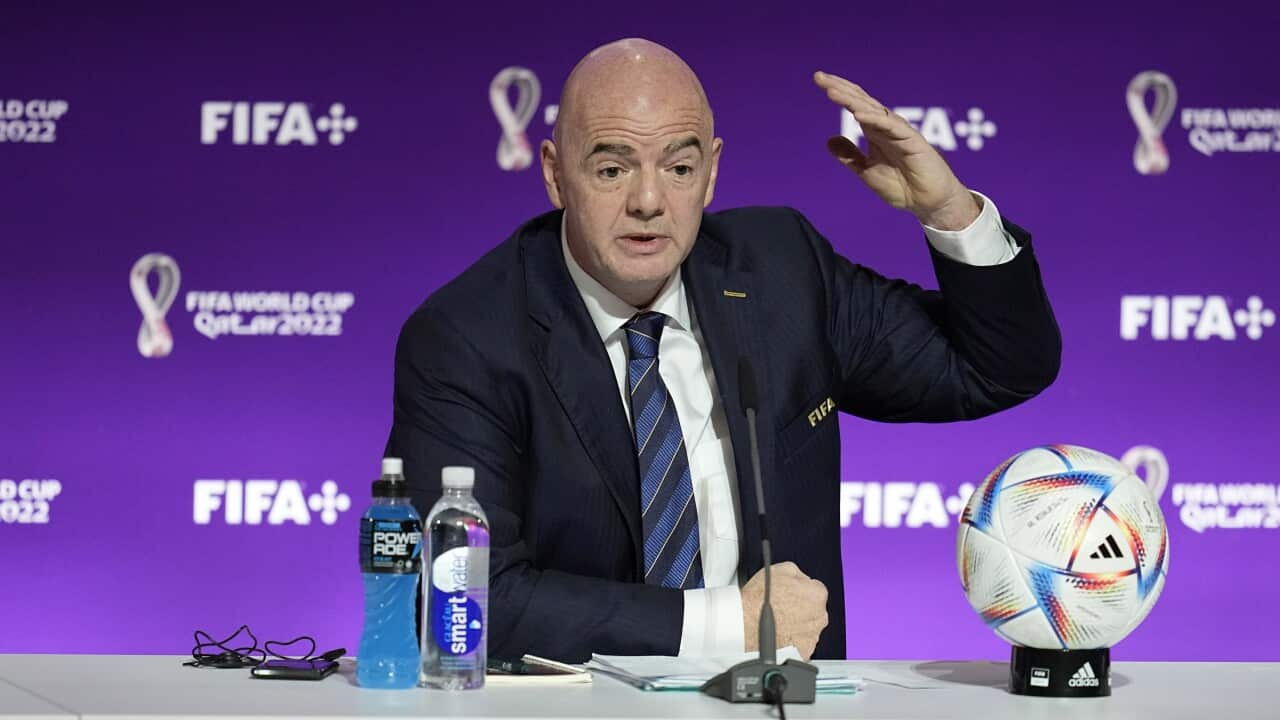Key Points
- FIFA had said fans would be free to fly rainbow flags at the World Cup.
- A former Wales footballer is among those who've been told they cannot wear rainbow coloured items at matches.
- Journalists have reported having their phones taken from them.
While the FIFA World Cup Qatar organising committee may have said LGBTIQ+ fans would not face discrimination, it appears free speech and self-expression may be another matter.
In August FIFA had said it remained confident promises of inclusion would be upheld, adding that supporters would be free to fly rainbow flags at matches.
However, with the tournament just three days old, numerous instances of rainbow flags and items being seized have already been reported in addition to players being warned of penalties if they wore rainbow colours on the field.
In the lead-up to the event FIFA had played down concerns raised about Qatar’s human rights record including relating to queer people.
Homosexuality is illegal in Qatar with a possible punishment of jail time but that LGBTIQ+ fans would not face discrimination during the tournament.
Wales national football team hats
The Football Association of Wales has raised concerns about treatment of people wearing its team’s rainbow merchandise in Qatar directly with FIFA.
Former Wales women's team captain Laura McAllister was one of a number of people who had rainbow-coloured Welsh Football hats they were wearing confiscated when attending a match between Wales and the USA.
The "rainbow wall" Wales Football team hats were designed specifically to show support for the LGBTIQ+ community.
Footage of the interaction has been shared widely online.
It’s understood McAllister was able to keep the hat but was told by security at the Ahmad Bin Ali Stadium that she could not wear it.
The Wales national football team, known as Cymru, made it into the World Cup for the first time in 64 years.
A statement from the Football Association of Wales said it was “extremely disappointed” by reports that staff and members of the association were asked to remove and discard their rainbow bucket hats before entry to the match.
“The FAW has collated information on these alleged incidents and will be addressing this matter directly with FIFA.”

Former Danish Prime Minister Helle Thorning-Schmidt wore an outfit featuring rainbow coloured sleeves while at the World Cup. Source: AAP / MADS CLAUS RASMUSSEN
While the rainbow on the flag of the Brazilian state of Pernambuco is supposed to represent peace, friendship and unity, a foreign journalist experienced the opposite on Monday, when a man outside a World Cup stadium grabbed his flag and stomped on it.
Brazilian journalist Victor Pereira, who is in Qatar covering the football tournament, said local police hassled him after a regional Brazilian flag he was carrying was mistaken for an LGBTQ pride flag.
He said authorities seized his phone after he recorded the man's negative reaction to the flag, which sports a rainbow, a red cross and a star.
He told Reuters that a man wearing a traditional white dress mistook it for the LGBTQ community's rainbow flag when he was leaving the Lusail Stadium after Saudi Arabia's win over Argentina on Tuesday.
"This guy wearing a white dress grabbed the flag, threw it on the ground and started stomping on it. I took my phone to record a video but he grabbed it from my hand and said he would only give it back if I deleted the video," Mr Pereira said.
"Then an officer arrived and tried to intervene. He grabbed the phone from the other guy and ordered me to delete the video."
Mr Pereira said he obeyed to make sure he would get his phone back as he uses it for work.
He later uploaded another video of the interaction on Twitter.
The Supreme Committee for Delivery and Legacy, Qatar's World Cup organisers, did not immediately respond to a request for comment by Reuters, nor did the Qatari government's media office.
American journalist Grant Wahl has said he was briefly detained on Monday when he tried to enter a World Cup stadium in Qatar while wearing a rainbow shirt in support of the LGBTQ community, also claiming his phone was seized.
A Qatari perspective
Nasser Mohamed, a Qatari man who has spoken about being openly gay, told an public displays of rainbow flags could be taken as a “provocative" act in Qatar during the World Cup.
“You’re just going and poking a bear and I don’t know if that is going to be productive,” he said.
At the same time, Mr Mohamed said there was a sort of “bubble” which foreign visitors to Qatar often existed within.
“People that are visiting Qatar, are not as severely persecuted as the ones that live there, the community in Qatar is the most persecuted,” he said.
Another man who took part in the podcast, who used the pseudonym ‘Ahmed’ said he and many other queer Qataris did not identify with the rainbow flag or labels such as LGBTIQ+.
“These codifications are problematic because they almost usurp everyone in the world, categorise them and segment them,” he said.
“There’s a sort of colonialist aspect to it, that we must fit into these categories.”




